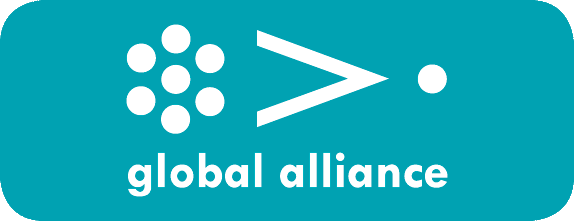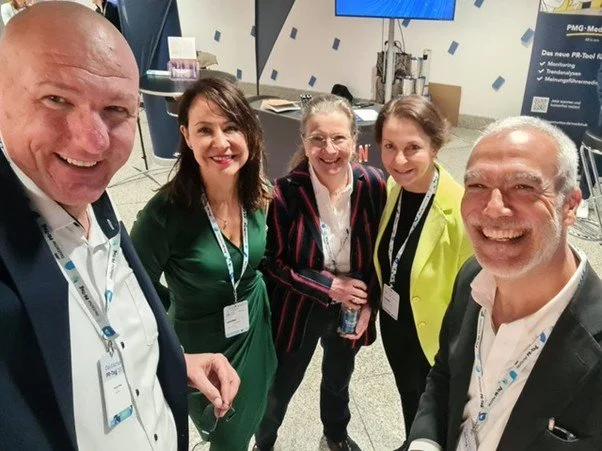Global Alliance Venice Summit and Stuttgart Panel Highlight PR’s Role in Navigating AI, Sustainability, and Geopolitical Tensions
The Global Alliance for Public Relation and Communication Management European Summit hosted in Venice by the Italian Federation of Public Relations FERPI provided the opportunity for global delegates from Asia/Pacific, North and South America and Africa/Middle East to join European colleagues from Italy, Germany, France, UK, Finland, Portugal, Czech and Estonia.
The focus was the Technology, Trends and Transformation in Communications month organised by the Global Alliance European Regional Council. A central topic for presentations was use of technology and AI in PR alongside sustainability.
The event was opened by Filippo Nani, President of FERPI and Prof. Justin Green, Global Alliance President & CEO. European Council Chair, Silvia Arto, set the scene on the use of technology and AI in PR highlighting the potential of new tools to allow the profession to focus more on strategic public relations.
Vincenzo Manfredi from FERPI lab spoke about the role technology and AI play in PR and the ethical issues that need to be considered, focusing in particular on the role that humans and PR professionals should claim and play.
Giampaolo Azzoni (who unfortunately could not attend on the day) provided an overview of the Epistemological and ethical limits of artificial intelligence in public relations.
Alberto Bitonti from University of Switzerland in Italy gave a great presentation on the use of big data, technology and AI in public affairs, showing the positive impact of the use of digital tools in public affairs, but also some concerns we should take into consideration while using those tools.
Mandy Pearse gave a presentation on the work CIPR have done in the UK on leading AI in PR through the institutes’ groundbreaking AI in PR panel which has produced a series of reports - insert link- some in collaboration with Canadian PR society. She also covered how CIPR is now mainstreaming AI into all its work, current trends in AI and the areas of discussion on AI.
Pavel Vlček and Jitka Němečková from the Czech Association of Strategic Communication and Public Affairs (ASCOPA) shared the ground breaking research done with IpsosMori into understanding how Central European consumers understand ESG and how much they are prepared to additionally spend with companies to have sustainable products.
Emanuela Locci from Google Italia talked about the potential of AI but also the responsibility that comes with its use. She highlighted the need for careful consideration of AI tools, understanding what data they use and how they work as well as ensuring oversight and scrutiny to ensure the public good.
Bonnie Caver and Adrian Cropley shared the work they have been undertaking on Responsible AI use in PR building on the ethical principles adopted by Global Alliance. Adrian presented the results of the global survey undertaken with PR institutes, agencies and organisations on adoption and use of AI in the PR industry.
Delegates then collaborated during a workshop to help define the Responsible AI principles which form the basis of the Venice Pledge.
Silvia Arto returned to the stage to thank Biagio Oppi from FERPI for the superb organisation of the summit.
Delegates from Global Alliance and FERPI then continued discussion of the PR industry challenges during a boat trip and dinner across the Venice lagoon.
On the second day the 11th edition of Inspiring PR conference was held welcoming 100 professional from all over Italy. During the opening, Prof. Justin Green announced the World PR Forum 2026 in Nigeria and in particular the session dedicated to Toni Muzi Falconi. Then during the morning session the Italian speakers analyzed and debated topics around Artificial Intelligence, ethics and transformations of public relations and media industry; in the afternoon six different workshops discussed and worked on six topics of interest.
Thanks go to FERPI for hosting this highly successful Venice summit building on the work of previous summits in Madrid and Lisbon.
Stuttgart
Following on from the success in Venice. Several members of the European Council - Silvia Arto, Antonio Rapoula and Pavel Vlcek then attended the German PR Association DPRG in Stuttgart on 22 May and delivered a panel debate on Corporate Communication in Times of Geopolitical Tension – How can PR help mitigate risks to reputation?” which speaks to the transformation in communication of this month.
Pavel Vlcek, Carsten Holtcamp, Silvia Arto, António Rapoula in the panel discussion
During the PR-Day of the German PR Association DPRG at Stuttgart on 22 May 2025 an international pane; discussed the topic of “Corporate Communication in Times of Geopolitical Tension – How can PR help mitigate risks to reputation?”
All panelists came from member organizations of Global Alliance for Public Relations and CommunicationsManagement.Silvia Arto is Vice President of Government Affairs and Global Head of Communications at BNP Paribas as well as Vice President of the Board of Directors at the Global Alliance for Public Relations and Communications Management. António Rapoula is working as a board member, manager and public relations consultant for both private companies and public agencies, as university teacher and vocational trainer. He is Council Chairman of the European Association for Internal Communications as well as Vice-President of the Portuguese Association for Corporate Communications. Last but not least the third guest on the panel was the Public Affairs and Strategic Communications expert, Pavel Vlcek. He is Chairman of ASCOPA, the largest professional association for PR and communications in the Czech Republic. He has recently been elected board member of Global Alliance. Pavel has advised international clients as well as the Government of the Czech Republic, especially in sustainable development. Moderator of the panel was Carsten Holtcamp, Director Public & Corporate Affairs at Kreab Worldwide.
This panel brought an international perspective at the focus of discussion was how in a world marked by geopolitical tensions, PR professionals need to learn how to manage corporate communications in uncertain times. This applies not only to crisis communications, but also to the positioning of brands in a globally politicized environment. Geopolitical events such as the Ukraine conflict or the trade wars between the USA and China present companies with the challenge of positioning themselves politically or remaining neutral. Corporate communications must be authentic and culturally sensitive at the same time.
Key topics being discussed were:
How do PR professionals navigate communication during geopolitical tensions, especially with international stakeholders?
In the context of geopolitical tension, communication professionals keep asking themselves whether they should advise company leaders to show and publicly share a clear stance on political issues or rather not. How is the perception on this in the different regions in Europe?
How can PR help mitigate risks to brand reputation during international conflicts?
Another important point in the discussion was DEI and the recent changes in the perception of this topic after some severe political changes and the fact that SAP for example recently announced a termination of its female leadership program.
The Allbright Foundation, which advocates for more women in leadership position, has identified types of responses to Trump’s demand to terminate all DEI programs. First, the "fighters”, who stand by their values, continue their work as before, and communicate this openly. Secondly those engaging in “camouflage” - removing bold DEI goals from their websites and annual reports but essentially continuing their diversity efforts behind the scenes (DEI-Hushing). And third the “opportunists,” who actually abandon goals and programs they fundamentally believe in.
The panel was discussing if and to what extent this makes sense and how corporate communications in a politically polarized environment is able to balance legal compliance and public pressure with the preservation of trust among global stakeholders who have come to expect strong ESG and CSR engagement.
About 40 minutes of discussion and the exchange of different views from different regions and experts from corporations, political organizations and agencies have given an insight into the the current key issues in communications and PR across Europe, the challenges communications professionals are facing in fulfilling their roles and responsibilities in business and society, the different approaches taken by different communications experts across Europe and how communications help bridge gaps within societies in such turbulent times.
Pavel Vlcek, Silvia Arto, Christina Kahlert and António Rapoula from the Global Alliance European Council





